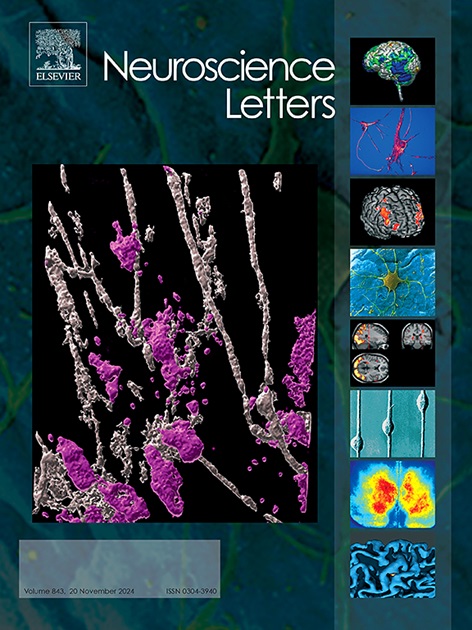Resveratrol ameliorates postoperative cognitive dysfunction in aged mice by regulating microglial polarization through CX3CL1/CX3CR1 signaling axis
IF 2.5
4区 医学
Q3 NEUROSCIENCES
引用次数: 0
Abstract
Postoperative cognitive dysfunction (POCD) is a common cognitive challenge faced by older adults. One of the key contributors to the development of POCD is neuroinflammation induced by microglia. Resveratrol has emerged as a promising candidate for the prevention of cognitive decline. Previous studies have demonstrated its potential in alleviating cognitive deterioration, yielding encouraging results. Nonetheless, the mechanism of resveratrol improving cognitive function remains unclear. Therefore, we assessed the effect of resveratrol in both aged POCD model mice and BV2 cells on CX3CL1/CX3CR1 axis, a critical signaling pathway mediating microglial activity. Both in vitro and in vivo experiments have revealed that pre-administration of resveratrol not only mitigates cognitive deficits but also significantly reduces the levels of inflammatory cytokines. Additionally, it enhanced the expression of SIRT1 and CX3CR1 within the hippocampal region. We also evaluated the impact of resveratrol on CX3CR1 siRNA transfected BV2 cells. Delete of CX3CR1 reversed the preventive role of resveratrol. Our findings implied that resveratrol might inhibit microglial activation and improve cognition by mediating CX3CL1/CX3CR1 signaling.

白藜芦醇通过CX3CL1/CX3CR1信号轴调节小胶质细胞极化,改善老年小鼠术后认知功能障碍。
术后认知功能障碍(POCD)是老年人面临的常见认知挑战。小胶质细胞诱导的神经炎症是POCD发展的关键因素之一。白藜芦醇已成为预防认知能力下降的有希望的候选药物。以前的研究已经证明了它在缓解认知退化方面的潜力,并产生了令人鼓舞的结果。尽管如此,白藜芦醇改善认知功能的机制仍不清楚。因此,我们评估了白藜芦醇在老年POCD模型小鼠和BV2细胞中对CX3CL1/CX3CR1轴的影响,CX3CL1/CX3CR1轴是介导小胶质细胞活性的关键信号通路。体外和体内实验均表明,预先给药白藜芦醇不仅能减轻认知缺陷,还能显著降低炎症细胞因子的水平。此外,它还增强了海马区SIRT1和CX3CR1的表达。我们还评估了白藜芦醇对CX3CR1 siRNA转染的BV2细胞的影响。CX3CR1基因的缺失逆转了白藜芦醇的预防作用。我们的研究结果表明,白藜芦醇可能通过介导CX3CL1/CX3CR1信号通路抑制小胶质细胞的激活并改善认知。
本文章由计算机程序翻译,如有差异,请以英文原文为准。
求助全文
约1分钟内获得全文
求助全文
来源期刊

Neuroscience Letters
医学-神经科学
CiteScore
5.20
自引率
0.00%
发文量
408
审稿时长
50 days
期刊介绍:
Neuroscience Letters is devoted to the rapid publication of short, high-quality papers of interest to the broad community of neuroscientists. Only papers which will make a significant addition to the literature in the field will be published. Papers in all areas of neuroscience - molecular, cellular, developmental, systems, behavioral and cognitive, as well as computational - will be considered for publication. Submission of laboratory investigations that shed light on disease mechanisms is encouraged. Special Issues, edited by Guest Editors to cover new and rapidly-moving areas, will include invited mini-reviews. Occasional mini-reviews in especially timely areas will be considered for publication, without invitation, outside of Special Issues; these un-solicited mini-reviews can be submitted without invitation but must be of very high quality. Clinical studies will also be published if they provide new information about organization or actions of the nervous system, or provide new insights into the neurobiology of disease. NSL does not publish case reports.
 求助内容:
求助内容: 应助结果提醒方式:
应助结果提醒方式:


